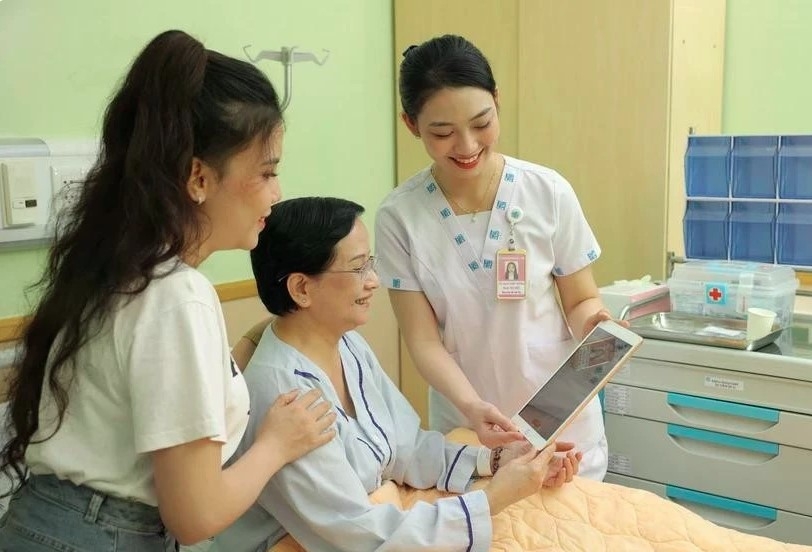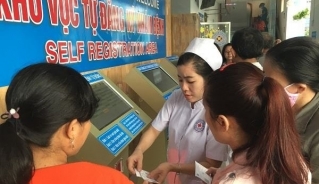HCM City’s smart healthcare system gradually pays off
Digital transformation in the medical sector of Ho Chi Minh City has been actively promoted, initially helping to modernise the city’s healthcare system and serve people more effectively.

In a recent business trip to Ho Chi Minh City, Nguyen Trong Huan, 48 years old, from the northern province of Thai Nguyen, ordered medicine through VNeID app and had it delivered to his hotel within about 15 minutes.
From January 1, 2025, people can buy medicine online from Long Chau pharmacy on the VNeID application. According to experts, the integration of various features, including online medicine purchases, marks an important step in the digital transformation of the healthcare sector, providing significant benefits, saving time, reducing costs, offering comprehensive health monitoring, and alleviating the burden on the healthcare system.
The online medicine purchase utility on the VNeID application is a component of the electronic health book, aiming to complete the entire health care process of people. This is an essential feature to meet the needs of people in proactively tracking their medical examination and treatment history, prescriptions and medicine purchase history on VNeID.
According to Associate Prof., Dr. Tang Chi Thuong, director of the Ho Chi Minh City Department of Health, the city's healthcare sector has for years been enhancing technology applications to develop a smart healthcare system, providing increasingly effective and convenient health services to the public. Hospitals in the city have made efforts to replace paper records to electronic ones, ensuring safe storage of patient information that is easily retrievable and shareable among healthcare facilities.
Thuong added that many hospitals have also implemented telemedicine, connecting doctors at health stations with specialists at general and specialised hospitals in the city. Telemedicine also provides professional support for health workers who work at health stations, especially when they encounter difficult or rare situations.
“The application of telemedicine is also widely implemented in consultations, remote training, and sharing medical experiences to enhance treatment efficiency, update treatment protocols, and apply it in continuous training and specialised consultations for provincial and municipal hospitals in the southern region,” Thuong said.
According to the city’s health department, almost all hospitals in the city have now adopted various digital conveniences to optimise the medical examination and treatment process, such as implementing online appointment systems, patient information kiosks, smart registration kiosks, and cashless payment options. Notably, the electronic health record has been integrated into the VNeID app, connecting data with all healthcare facilities and linking with the health insurance claim data reception portal.
Many hospitals have integrated artificial intelligence (AI) into their medical examination and treatment, initially creating many positive values, such as robotic surgery at Binh Dan Hospital; the use of robots for bone biopsies in hard-to-reach areas at Military Hospital 175; and AI applications in imaging diagnostics (X-ray, CT-Scanner, MRI) at many hospitals. The application of AI in radiation therapy planning at Ho Chi Minh City Oncology Hospital has achieved high precision and reduced treatment time.
Moreover, Nhan Dan 115 Hospital is the first unit in the country to apply the AI RAPID software for thrombolysis intervention in treating patients with cerebral infarction who are hospitalised after six hours.
Private hospitals in the city have also contributed many advanced technical applications integrated with AI, such as Tam Anh Hospital with AI robotic surgery for brain and spinal surgeries, and AI-enhanced digestive endoscopy that helps early detect cancer and gastrointestinal abnormalities. Gia An Hospital applies AI in stroke treatment.
Community health management and epidemic prevention have also been digitised. Since 2016, a Geographic Information System (GIS) has been implemented at the Ho Chi Minh City Centre for Disease Control (CDC) to monitor and manage infectious diseases, especially dengue fever, Zika, whooping cough, typhoid, and diarrhea, providing risk alerts across four levels to support epidemiological surveillance and outbreak control.
To date, the Ho Chi Minh City CDC has also implemented several screening applications, disease intervention, and digital platforms for managing HIV/AIDS patients, enhancing treatment efficiency for patients.
In addition to medical examination and treatment, the city's healthcare sector is also promoting technology applications in administrative management and reforms. For instance, the professional information lookup portal allows the public to easily find suitable healthcare facilities based on specialties, types, quality, and costs.


